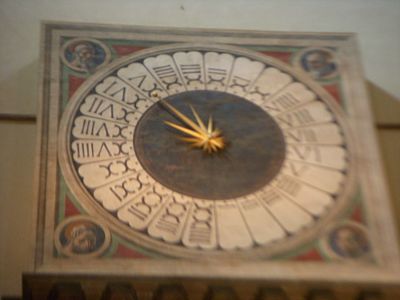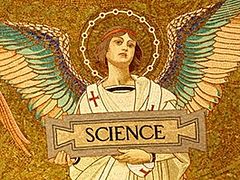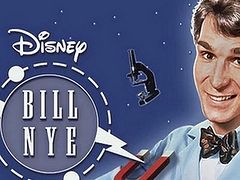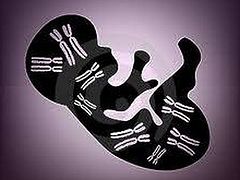Source: Patheos
January 18, 2016

Natural science has done good things for humankind. My ability to work while on a plane flying across a continent is a gift from scientists following the scientific methods to improve human knowledge and life. Science makes progress, increasing in understanding, and this progress is beneficial to humanity.
Yet the very moment this is said, when our support for science is expressed, we must qualify our happiness. Science has given us great gifts, but science has also enabled us to kill more efficiently, pollute our Earth more completely, and alienate ourselves from our true natures as humans.
Scientific knowledge may progress, but humans use this knowledge. We use knowledge to do good deeds or to harm. Science cannot tell humanity what to do, because science can only manipulate matter and energy.
Science has no power over the real realm of ideas and cannot tell humanity what we ought to do. For example, science might tell us that if we continue to burn fossil fuels that certain results will occur. We must decide whether these results are desirable or undesirable. Science can tell us that an operation might cure a disease, but not whether we should have the operation. The cure can be worse in a particular context than the disease. This will not be a scientific judgment, but a human decision.
Ethics is a branch of knowledge where progress can be made, but the progress comes in different ways. Ancient people may have solved ethical problems and discovered ethical truths that have not changed as scientific ideas have changed. Aristotle discovered that some acts are always bad (like adultery). Science has given men and women new ways to do bad things, but the nature of the evil has not changed!
Religion benefits the scientist, even if it did not benefit science! Science can tell a scientist what is, but religion, with revelation from God, tells the scientist what ought to be.
Christianity in particular has done more for science than merely provide an ethical framework for humanity, though that would be a great deal. Christianity also provided the philosophical underpinnings that made science possible. My colleague Nancy Pearcey has written a very readable book showing this fact, but few serious philosophers of science dispute it.
Maybe some other religion could have allowed science to develop and flourish, but none did. Maybe science could have developed in a godless society, but it did not. Street atheists have the idea of history that there were secular Greek and Roman thinkers and then Christianity came and delayed progress with a Dark Age. Edward Gibbon, who disliked religion and loathed the Orthodox, gave Western culture this view in his Decline and Fall of the Roman Empire and street atheists have not exercised his mistakes yet.
Greek Orthodox people need not be told that the Eastern Roman Empire preserved secular Greek and Roman learning for centuries. The Orthodox maintained a strong educational system and did not just repeat the ideas of the past, but developed them. Orthodox educators and philosophers provided much of the impetus (and often did a lot of the work) for both the Western Renaissance and the Islamic Golden Age. Even in the West, the idea of a “dark age” is a myth. C.S. Lewis exposes a great many of our mistakes about the Western Medieval in his indispensable and highly readable The Discarded Image.
In fact, as John Losee and other scholars in the history of the philosophy of science demonstrate, we needed the right philosophy regarding science before we could produce science. The Christian doctrine of the Incarnation was one of those vital ideas.
Aristotle was often frustrated in getting young Greeks to look at the physical world. Such tasks were “beneath” the budding philosophers. Ideas were “clean” and the material world was “dirty.” When God became flesh, He ended that mistake forever for Christians. God had become man and so matter was sanctified.
Some religions went in a different direction. They made the material world divine in a strong sense. You could not study the natural world, because to do so was blasphemy. If that tree is your god, then cutting up the tree to study it is a kind of impiety.
Christianity made nature good without making it god. Science was a noble task, but not an impious one. Jesus Christ bridged the gap in His two natures between the metaphysical and the physical. When the Orthodox cross themselves, showing the truth of the two natures of Christ, we may not recollect we were making modern science possible, but we were!
Believers developed ideas assumed by scientists today, even atheists. When William of Ockham developed the idea that the best explanations will not multiply entities needlessly (simple theories are best), he did so because he was a Christian. The Christian God is wise and good. He will design wisely. An atheist might use “Ockham’s Razor” because it works, but has no reason for why it works.
Believers followed Plato (also a theist, though obviously not a Christian) in using mathematics to explain the world. Mathematics cannot be grasped using science. Numbers exist, but are immaterial. A Christian is comfortable with immaterial reality and has no problem using mathematics to explain the world. If one is an atheist, the existence of numbers and the usefulness of mathematics is a problem. Why does math work? The Christian theist never doubted it would.
Christianity is not hostile to science. Christianity was a parent of science and Christians continue to work in science. Saints of the Orthodox Church have been scientists in recent times such as Saint Luke of Crimea! Christianity will not allow science to overstep her bounds and claim to be the only source of knowledge. Scientism, the notion that only science finds truth, is the enemy of Christ, but it is also the enemy of poetry, art, and mathematics!



